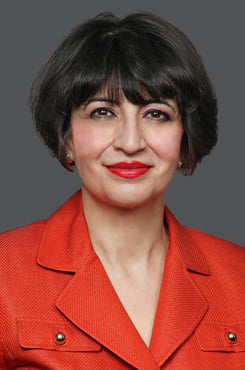Bracing for Brexit With Mayer Brown's Global Migration Practice Chief
Liz Espín Stern has seen international employment issues become more complex as she's grown her practice from four lawyers to more than 40 in the last six years.
January 23, 2020 at 03:23 PM
4 minute read
 Courtesy photo
Courtesy photo
Mayer Brown partner Elizabeth Espín Stern is based in Washington, D.C., not London or Brussels. But Brexit has been her business ever since Britons signed on to the idea of ditching the European Union in 2016.
The United Kingdom is set to formally withdraw by the end of the month—three and a half years after the Brexit referendum, and six years after Stern launched Mayer Brown's global mobility and migration practice in 2014.
Stern's practice has since grown from four to more than 40 lawyers, advising multinational clients on managing their international employees and navigating the legal challenges that entails, especially as countries face uncertain political and economic futures.
The departure of the U.K., the world's sixth-largest economy, from the EU, the world's second-largest economy, is one of the challenges that has been keeping Stern and her team busy.
 Elizabeth Espín Stern of Mayer Brown (courtesy photo)
Elizabeth Espín Stern of Mayer Brown (courtesy photo)"Until the elections on Dec. 12 … no one knew for certain how the cliffhanger of Brexit would end," said Stern, referring to the U.K. general election that elevated Prime Minister Boris Johnson's Conservative Party to power. "Would there in fact be a hard Brexit—that after all of the start and stops with the European Union, the U.K. would abruptly leave with absolutely no plan in place?"
Stern said Johnson's December victory means that, at this point in time, the U.K.'s withdrawal from the EU is going to be a relatively organized exit, with the U.K. parliament poised to pass a withdrawal bill by Jan. 31.
With the financial sector among the industries grappling with Brexit, Stern and her colleagues have been advising financial institutions to review the locations and citizenship of their British and European workforces, and to take whatever steps that will be necessary in the coming year.
For instance, if a European national is living and working in the U.K., they might want to apply for settled status there, which would allow them and their families to stay in the U.K. after Brexit, Stern said. They have until the end of June 2021 to do so, she added.
There won't be any immediate changes between the U.K. and the EU that will directly affect workers' status, Stern noted. Until the end of the year, British and European nationals will still be able to move between the U.K. and the EU as if the former had never left the latter.
When Stern started Mayer Brown's global mobility and migration practice, she said she saw a gap in the legal market for multinational corporations in need of advice on local and regional employment rules.
"Today, there are many, many countries that require the employer to know that every employee that works for their enterprise in Country X has a lawful right to work. If the employer doesn't validate that … there is typically criminal liability for that, in most regions of the world," Stern said.
The practice group has grown to 22 partners, four counsel, 16 associates and support staff spread across four continents. Their work has become more complex, but Stern said they thrive on helping clients overcome crises and come up with "extraordinary solutions."
Stern said her international background helped position her to take on the work she handles now. She's the daughter of an Ecuadorian diplomat who advised several presidents of the small South American country and once worked for the Organization of American States.
"I feel like I returned to my roots when I launched into a global immigration practice," Stern said.
This content has been archived. It is available through our partners, LexisNexis® and Bloomberg Law.
To view this content, please continue to their sites.
Not a Lexis Subscriber?
Subscribe Now
Not a Bloomberg Law Subscriber?
Subscribe Now
NOT FOR REPRINT
© 2025 ALM Global, LLC, All Rights Reserved. Request academic re-use from www.copyright.com. All other uses, submit a request to [email protected]. For more information visit Asset & Logo Licensing.
You Might Like
View All
Paul Hastings, Recruiting From Davis Polk, Adds Capital Markets Attorney
3 minute read
Kirkland Is Entering a New Market. Will Its Rates Get a Warm Welcome?
5 minute read

Goodwin Procter Relocates to Renewable-Powered Office in San Francisco’s Financial District
Trending Stories
Who Got The Work
J. Brugh Lower of Gibbons has entered an appearance for industrial equipment supplier Devco Corporation in a pending trademark infringement lawsuit. The suit, accusing the defendant of selling knock-off Graco products, was filed Dec. 18 in New Jersey District Court by Rivkin Radler on behalf of Graco Inc. and Graco Minnesota. The case, assigned to U.S. District Judge Zahid N. Quraishi, is 3:24-cv-11294, Graco Inc. et al v. Devco Corporation.
Who Got The Work
Rebecca Maller-Stein and Kent A. Yalowitz of Arnold & Porter Kaye Scholer have entered their appearances for Hanaco Venture Capital and its executives, Lior Prosor and David Frankel, in a pending securities lawsuit. The action, filed on Dec. 24 in New York Southern District Court by Zell, Aron & Co. on behalf of Goldeneye Advisors, accuses the defendants of negligently and fraudulently managing the plaintiff's $1 million investment. The case, assigned to U.S. District Judge Vernon S. Broderick, is 1:24-cv-09918, Goldeneye Advisors, LLC v. Hanaco Venture Capital, Ltd. et al.
Who Got The Work
Attorneys from A&O Shearman has stepped in as defense counsel for Toronto-Dominion Bank and other defendants in a pending securities class action. The suit, filed Dec. 11 in New York Southern District Court by Bleichmar Fonti & Auld, accuses the defendants of concealing the bank's 'pervasive' deficiencies in regards to its compliance with the Bank Secrecy Act and the quality of its anti-money laundering controls. The case, assigned to U.S. District Judge Arun Subramanian, is 1:24-cv-09445, Gonzalez v. The Toronto-Dominion Bank et al.
Who Got The Work
Crown Castle International, a Pennsylvania company providing shared communications infrastructure, has turned to Luke D. Wolf of Gordon Rees Scully Mansukhani to fend off a pending breach-of-contract lawsuit. The court action, filed Nov. 25 in Michigan Eastern District Court by Hooper Hathaway PC on behalf of The Town Residences LLC, accuses Crown Castle of failing to transfer approximately $30,000 in utility payments from T-Mobile in breach of a roof-top lease and assignment agreement. The case, assigned to U.S. District Judge Susan K. Declercq, is 2:24-cv-13131, The Town Residences LLC v. T-Mobile US, Inc. et al.
Who Got The Work
Wilfred P. Coronato and Daniel M. Schwartz of McCarter & English have stepped in as defense counsel to Electrolux Home Products Inc. in a pending product liability lawsuit. The court action, filed Nov. 26 in New York Eastern District Court by Poulos Lopiccolo PC and Nagel Rice LLP on behalf of David Stern, alleges that the defendant's refrigerators’ drawers and shelving repeatedly break and fall apart within months after purchase. The case, assigned to U.S. District Judge Joan M. Azrack, is 2:24-cv-08204, Stern v. Electrolux Home Products, Inc.
Featured Firms
Law Offices of Gary Martin Hays & Associates, P.C.
(470) 294-1674
Law Offices of Mark E. Salomone
(857) 444-6468
Smith & Hassler
(713) 739-1250










